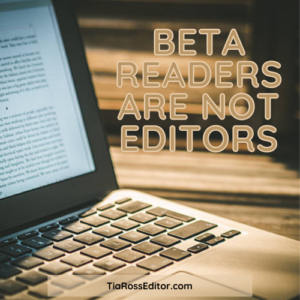I’m writing a book and will definitely get beta readers because I can’t afford an editor.
When you see a book published on Amazon with lots of errors, find the author’s email and reach out to them to suggest they find a beta reader.
It’s not hard to get 2-3 beta readers to edit your book.

These types of comments are common, but they are misleading as they’re quite inaccurate. This article is to help clarify what beta readers are, what reasonable expectations are related to beta readers, and whether you should enlist the services of a beta reader or an editor.
Contrary to popular belief, beta readers and editors are not interchangeable. Beta readers should not automatically be expected to possess the expertise or skill to properly edit your fiction or nonfiction and should never replace an experienced editor.
What are beta readers for?
Beta readers are typically individuals who read a draft of a manuscript and provide feedback to the author, often in the form of general impressions and suggestions for improvement. Beta readers are those who read your book as READERS—ideally, not people who love you and can’t bring themselves to say anything negative about your work—but as objective readers who can give honest feedback on what did and did not work for them in your book. They comment on things like detail inconsistencies, where their attention wavers, what they think of the characters, and confusing sentences, subplots and twists. They address weak spots in your manuscript before you share it with the world.
Beta Readers Are Not Editors
While beta readers can provide valuable feedback, they should not be considered editors for several reasons.
First, beta readers typically do not have the expertise or training in editing that professional editors have. Editors are trained to identify issues related to grammar, syntax, structure, pacing, and style, among other things, and they have experience working with various types of writing. This expertise allows them to provide more detailed and nuanced feedback on a manuscript. In addition, line editors and copyeditors are also trained to ensure overall adherence to a specific style manual. Many beta readers are unaware that style manuals exist, much less how they relate to a manuscript.
Second, beta readers typically do not have the same level of engagement and commitment to the manuscript as an editor. Editors are usually hired specifically to work on a manuscript and have a vested interest in ensuring that it is as polished and successful as possible. Beta readers, on the other hand, may not have the same level of investment in the manuscript and may not be as thorough or rigorous in their feedback.
Finally, beta readers are usually unpaid volunteers, while editors are professionals who are compensated for their work. This compensation is a reflection of the time, expertise, and effort that editors offer.
While beta readers can be a valuable resource for authors seeking feedback on their work, they should never be considered a substitute for professional editing.
Where can I find Beta Readers?
Black Writers Collective offers a beta readers program, which is free to members and membership is free. Join at the Affiliate level for access.
Learn more @ blackwriters.org/groups/beta-readers/.
Black Writers Collective will also share your search for beta readers with its 21K Twitter followers.
You can also find beta readers in groups like Black Girls Read Too on Facebook or via Twitter #writingcommunity.

Finally! Someone came out and said it! I’ve been debating with writers and readers about this for years and it’s been so frustrating. Beta readers? You do NOT replace a professional editor with a beta reader! Those two are not even remotely the same! We don’t even use the same beta readers when we’re seeking first-round ARCs, because we want PROFESSIONAL reviews. If you absolutely, positively CANNOT afford an editor by any means necessary, there are some hacks… like in our area a program has been set up where English and writing professors from various colleges and universities (even community colleges) offer up an hour of their time per week to read over someone’s work from the community. Try networking with some colleges in your area and do the same thing. Awesome article, Tia.
This article by Tia Ross and the comment are keepers to share with anyone who wants to know why an editor is not optional.